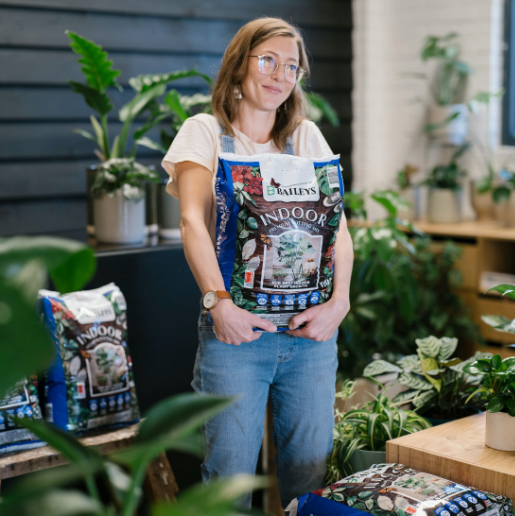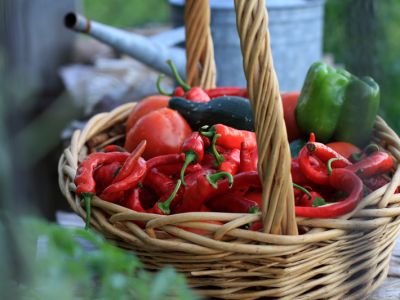
Join our Great Gardens Club!
Sign up to enjoy 15% off your first purchase from Baileys online. Plus, get our monthly WA gardening tips, latest news and promotions straight to your inbox.

Sign up to enjoy 15% off your first purchase from Baileys online. Plus, get our monthly WA gardening tips, latest news and promotions straight to your inbox.
The list of possibilities is enormous, from the everyday potato, parsley and tomato through to the oddballs such as sweet leaf stevia, ladies fingers and red hot chilli Habanero. We recommend choosing varieties not readily available in shops or heavily consumed types. So for example, kale or spinach is great value for vegetable juices and salad bases. Likewise herbs like parsley, basil, spring onions and mint are needed as much as two or three times a day, so growing these at home is a must. Even though the possibilities are endless, work out what will be best value for you. Remember, don't aim to grow everything, just grow something to go into every meal.
The biggest job is setting up the bed and planting initially. After this a daily check is important. You can set up inexpensive automatic watering systems, some run from a single tap, to keep your patch well-watered. The next biggest time consumer is harvesting, but we rarely hear gardeners complaining about the minutes spent bringing in the crop.
In WA, autumn, winter and spring are the easiest times because seasonal rain does most of the watering. Summer is a testing time for us as well as our vegetables. Set up a light shade cloth cover if contemplating growing summer vegetables.
Seed is the most cost effective way to start your edible garden. Some large growing types such as sweet corn and broad beans as well as the pea family seem to be more successful if directly sown into the garden bed. The good thing about buying seedlings, apart from the jump start aspect, is that whatever is on sale in the garden centre is right for the current season. For the truly impatient gardener ready to pick can bestow a gourmet chef label on you; on the same day.
The first essential is soil improvement because our gutless sands can not do a good growing job without the addition of soil carbon. Baileys Soil Matters Clay & Compost or Soil Improver Plus are the answer depending on your soil. Use Soil Matters Clay & Compost on sandy soils and Soil Improver Plus on clay soils. Check each bag for application rates and instructions. Once you have added these to your existing soil, water in well and get planting. Your plants will thank you for the soil preparation.
You need a quality planting mix to give your plants a good start and to supply nutrients through the season. Baileys Veg and Herb Premium Planting Mix contains controlled release nutrients to keep growth humming for up to three months. For raised garden beds fill the base with sand up to 30 cm from the rim. Top up to the rim with Baileys Veg and Herb Premium Planting Mix.
Mulching works well in vegetable growing, helping to retain moisture and suppress weeds. We recommend using an organic feeding mulch such as Baileys Moisture Mulch, which will also enrich the soil as it breaks down. Baileys organic based Soil Matters Garden is specifically designed for WA conditions and the ideal plant food for vegetable and herb growing. Use regularly for these hungry feeders, roughly a good handful per square metre once a month.

Summer & Autumn
Tomatoes, capsicum, chillies, pak choi, spring onions, okra, cucumbers, zucchini, pumpkin, beans, sweet potato, kang kong (water spinach), choko, eggplant, sweet corn and lettuce.
Winter & Spring
Cabbage, broccoli, cauliflower, pak choi, Chinese cabbage, onions, spring onions, garlic, potatoes, sweet fennel, artichoke, peas (including sugar snap and snow peas), carrots and lettuce.
Semi-permanent vegetables
These can be planted at any time of year and include choko, asparagus, Ceylon spinach (basella), kale and the unusual Indian tree vegetable - drumsticks (moringa).
Herbs for all year round
Parsley, sage, thyme, chives, mint, nasturtiums, lemon grass (perennial), oregano, marjoram, fennel and dill. Rosemary, curry leaf tree and lemon verbena are permanent shrubs.
Herbs for a particular season
Both French tarragon and sweet basil don't like the cold of our winter, whereas coriander does best here in mid-winter to spring where it doesn't bolt into flower so quickly. Borage is also a winter variety. Stevia, because of its tropical origins, is strictly a hot season herb as is turmeric and ginger.